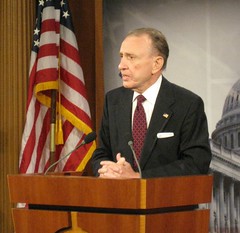Monday
Jul132009
Senate Begins Grilling Of Sonia Sotomayor
Republican senators today began their attacks on Judge Sonia Sotomayor, nominated to replace Justice David Souter on the U.S. Supreme Court. On the first day of hearings before the Senate Judiciary Committee, Democratic senators praised Sotomayor’s record, saying it demonstrated “judicial modesty,” while Republicans expressed skepticism.
Senator Jeff Sessions (R-Ala.), now the ranking Republican on the committee, called Sotomayor’s comments on use of experience and background in judicial decisions “shocking and offensive” and distributed a thick stack of her past speeches to the media. The speeches were marked up to highlight passages where Sotomayor spoke about the differences her background would produce in her decisions. Sessions criticized the use of any factors outside of the facts and law of a case in making rulings.
Senators Sessions and John Cornyn (R-Texas) both said they planned to ask Sotomayor about her views on a range of issues, including abortion, property rights, the right to bear arms, and capital punishment. Senator Tom Coburn (R-Okla.) as well said he was “deeply concerned by [Sotomayor]’s assertion that the law is uncertain.”
Speaking more generally, Senators Orrin Hatch (R-Utah), Chuck Grassley (R-Iowa) and Lindsey Graham (R-S.C.) criticized President Obama’s “empathy” standard used to select Sotomayor as his nominee. Graham went so far as to say that he would have to vote against Sotomayor under that standard, which he called “absurd” and “dangerous,” since it would encourage voting on the basis of agreement on issues and would therefore discourage potential nominees from expressing their opinions. He did, however, worry about Sotomayor’s speeches made while she has been a sitting judge, since those might cast doubt on her objectivity when deciding cases. Graham did recognize that “unless [Sotomayor has] a complete meltdown,” she would be confirmed, bringing laughter from audience.
Democrats generally supported the nominee by describing her record as centrist and reserved, and repeating her personal story of being raised by a poor, single mother and working to raise herself up to a federal judgeship. By the time it was Sotomayor’s chance to speak, the audience had heard the story several times.
A couple of Democrats took the opportunity to criticize the previous administration. Senator Specter (D-Pa.), a recent defector from the Republican party, spoke of President Bush’s wiretapping program, saying that a split among circuit courts in different areas of the country has prevented adjudication of the legality of those programs. He expressed hope that a new Supreme Court would resolve this disagreement and generally agree to hear more cases. Senator Feingold (D-Wisc.) lauded the Supreme Court’s role as a check on the president, offering as examples the Court’s rulings that Guantanamo detainees have rights to U.S. courts, and saying that an important quality in justices is a willingness to stand up to the president.
In Sotomayor’s short opening statement, she said that her judicial philosophy was simple: “fidelity to the law.” She said that her record would show that she applies the law according to Congress’s intent, applying relevant precedents. She finished by saying she looks forward to answering the senators’ questions.
Senator Jeff Sessions (R-Ala.), now the ranking Republican on the committee, called Sotomayor’s comments on use of experience and background in judicial decisions “shocking and offensive” and distributed a thick stack of her past speeches to the media. The speeches were marked up to highlight passages where Sotomayor spoke about the differences her background would produce in her decisions. Sessions criticized the use of any factors outside of the facts and law of a case in making rulings.
Senators Sessions and John Cornyn (R-Texas) both said they planned to ask Sotomayor about her views on a range of issues, including abortion, property rights, the right to bear arms, and capital punishment. Senator Tom Coburn (R-Okla.) as well said he was “deeply concerned by [Sotomayor]’s assertion that the law is uncertain.”
Speaking more generally, Senators Orrin Hatch (R-Utah), Chuck Grassley (R-Iowa) and Lindsey Graham (R-S.C.) criticized President Obama’s “empathy” standard used to select Sotomayor as his nominee. Graham went so far as to say that he would have to vote against Sotomayor under that standard, which he called “absurd” and “dangerous,” since it would encourage voting on the basis of agreement on issues and would therefore discourage potential nominees from expressing their opinions. He did, however, worry about Sotomayor’s speeches made while she has been a sitting judge, since those might cast doubt on her objectivity when deciding cases. Graham did recognize that “unless [Sotomayor has] a complete meltdown,” she would be confirmed, bringing laughter from audience.
Democrats generally supported the nominee by describing her record as centrist and reserved, and repeating her personal story of being raised by a poor, single mother and working to raise herself up to a federal judgeship. By the time it was Sotomayor’s chance to speak, the audience had heard the story several times.
A couple of Democrats took the opportunity to criticize the previous administration. Senator Specter (D-Pa.), a recent defector from the Republican party, spoke of President Bush’s wiretapping program, saying that a split among circuit courts in different areas of the country has prevented adjudication of the legality of those programs. He expressed hope that a new Supreme Court would resolve this disagreement and generally agree to hear more cases. Senator Feingold (D-Wisc.) lauded the Supreme Court’s role as a check on the president, offering as examples the Court’s rulings that Guantanamo detainees have rights to U.S. courts, and saying that an important quality in justices is a willingness to stand up to the president.
In Sotomayor’s short opening statement, she said that her judicial philosophy was simple: “fidelity to the law.” She said that her record would show that she applies the law according to Congress’s intent, applying relevant precedents. She finished by saying she looks forward to answering the senators’ questions.





 Monday, July 13, 2009 at 4:24PM
Monday, July 13, 2009 at 4:24PM


Government Spending Watchdogs Release Annual Pork List
“[Members of Congress] have noticed it’s popular to posture as an anti-earmaker,” Tom Schatz, CAGW president said upon the summary's release. “Unfortunately ... most members of Congress still aren’t willing to eliminate the practice.”
Of the billions spent for pork projects, $490 million came from Sen. Thad Cochran (R-Miss.), who was named as one of the top “Oinkers,” or pork-pursuers, of 2010.
Democratic Senators also made it onto the watchdog’s radar. Tom Harkin (Iowa) and Robert Byrd (W. Va.) were both taken to task for seeking approximately $7,000,000 for projects named after them. Arlen Specter (Penn.) was chastised for securing $200,000 for a “small business incubator and multipurpose center.”
A bipartisan push by Sen. Kay Bailey Hutchinson (R-Texas) and Rep. Ciro Rodriguez (D-Texas) also came under fire. The two Texans were grilled for an allocation of $693,000 for “beef improvement research.”
Hawaii came in at number one for the most pork spent per capita, with a projected $251.78 for each member of the state’s population. Alaska, who earned the dubious top spot last year, dropped to 4th on the list.
Although CAGW acknowledged that there has been a 15.5 percent decrease in pork-barrel spending from 2009, the organization notes that improvements still need to be made, both in the reduction of spending and overall transparency.